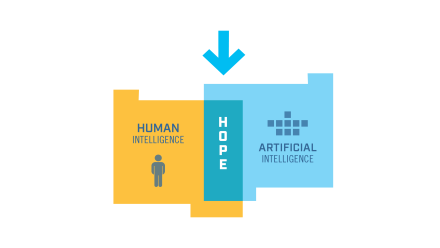President Connie Ledoux Book reflects on the potential of artificial intelligence in higher education and beyond.
An Elon colleague recently lamented that she had received an email from a co-worker that was “so over the top” in kindness that she knew it was generated using OpenAI’s ChatGPT. I chuckled because it doesn’t take long for new understanding of technologies to raise our own digital literacy to sniff out a fake. That said, I also don’t want to begin my observations about artificial intelligence with an oversimplification of the strength of these new and emerging tools that are bringing AI to the forefront for millions of users around the world.

In the summer 2023 issue of The Magazine of Elon, you will read about the efforts underway by faculty and staff to prepare students and our own community of employees for a future that recognizes the centrality of AI to what comes next for our world.
I wish I could say that the future is all rosy, and just like the benefits brought about by railroads and the printing press, we are on the cusp of a renaissance of good, great and better. While the majority of what will emerge will be good, we also know that artificial intelligence will present its own unique challenges that need to and should be influenced by human intelligence.
History tells us that after the arrival of an invention, there is often a period of “moral panic” when people realize its potential for negative use. We’ve already seen concerns raised that ChatGPT will lead to cheating and that it will write college essays and pass exams. You will read in this edition that rather than effecting purely negative changes, ChatGPT’s power to improve a student’s starting point and to provide individualized learning assistance and tutoring can be transformative and will amplify student learning.
A Venn diagram can be used to illustrate that the two bodies of artificial and human intelligence naturally overlap, but also have their own capacities. I would argue that where the two overlap, the work of higher education is the most critical. In that space, hope emerges — hope for the positive and powerful use of technology to enhance and improve our changed lives.
In this overlapping space of hope, Elon’s intentionality of incorporating human values and judgment will work to ensure that our community contributes to the positive potential of AI technology.
The advent of user interfaces to support transformative engagement with AI is one of the reasons I am excited about Elon’s new emphasis on students demonstrating data competency, a goal outlined in the Boldly Elon strategic plan. Faculty and staff have developed a vision that every Elon graduate will have a strong command of data and data tools. Elon graduates today and tomorrow will provide critical leadership in the use of data to solve challenges and demonstrate the ability to visualize and share that data as part of the engaged learning goals of the university.
My own research as a graduate student at the University of Georgia focused on the adoption of new technologies. At the time, we were zoned into understanding the launch of the internet browser Mosaic, which was soon followed by Netscape. These new tools, much like ChatGPT, put the power of the internet into the hands of the people. Soon after, new computer modems powered by phone lines were congested and crawled at a snail’s pace as they worked to send data. This resulted in a cry for more robust data processing speeds and soon the greatest wiring effort in the world was underway. Thirty years later we all saw the critical role of broadband during the pandemic, an infrastructure that would never have existed without the launch of a public internet user interface in 1993 designed for the people.
Elon is already being impacted by AI, whether it is an email from a co-worker or new admissions software that helps customize messages about academic programs of interest to applicants. As this new future unfolds, let’s also recognize that human intelligence can and should exert influence over what we do with AI. In this overlapping space of hope, Elon’s intentionality of incorporating human values and judgment will work to ensure that our community contributes to the positive potential of AI technology.


